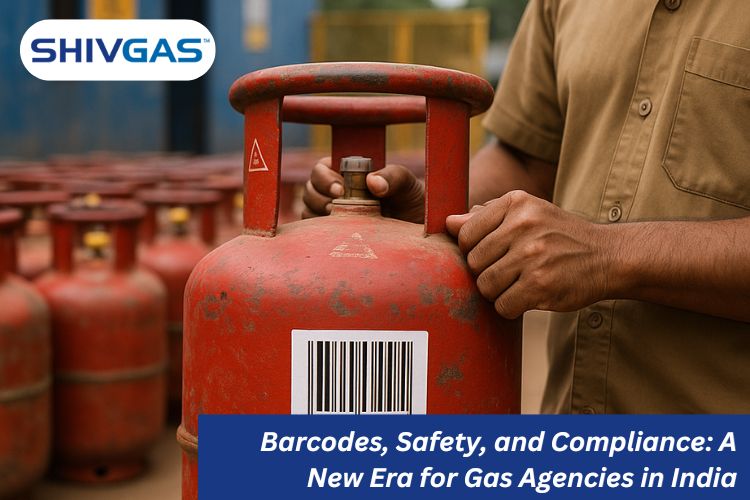
In India’s all time evolving energy needs, gas agencies are no longer just intermediaries. They are an important part of India’s fuel supply system. Whether it’s LPG for homes or vehicles, these agencies make sure people get their gas cylinder when they need it, safely and on time.
Recently, the government has made some important changes that revolve around gas cylinders. These revisions are not just bureaucratic adjustments; rather, they redefine the way in which cylinders can be identified, stored, transported, and filled.
This blog explores what these new rules mean for a gas agency and how they impact day-to-day operations.
A gas cylinder is a metal container that has a capacity of 1000 liters or weighing around 17kg in some cases. This size is usually suitable for commercial and domestic purposes. The recent amendment includes composite cylinders and cryogenic containers, with some exceptions, and requires permanent bar code marking on all cylinders and containers.
This change helps to determine which cylinders fall under regulatory purview and qualify for the safety enforcement criteria.
As per the new government norms, the introduction of tamper-proof, permanent bar codes for LPG gas cylinders has been made compulsory for every gas agency. This bar code must be placed in a part that can be easily noticed and is readable during operational procedures.
The barcode features:
This means that gas agencies have to invest in scanning technology and maintain updated digital records of their cylinder inventory.
The current government notification instructs inspecting authorities to keep a tap on gas agencies, manufacturers, and distributors based on barcode-related information. These entities need to submit all details in both physical and digital formats within 48 hours of receiving the notice from inspecting officers.
Failure to comply can lead to penalties or operational delays, making record management and real-time tracking an indispensable part of gas agency workflows.
Another mandatory measure is the scanning of barcodes before any LPG is filled in cylinders. If the barcode is unreadable, invalid, or associated with a cylinder that has not passed its periodic safety tests, it must not be filled.
For gas agencies, this means integrating barcode scanning tools and validation protocols at filling stations. It also requires
Only those cylinders that have been subjected to the rigorous test procedure at accredited stations and are cleared by the Chief Controller are allowed for filling. Gas agencies are expected to:
With the addition of new cylinder rules, gas agencies now need to step up and follow the right steps to keep things safe, compliant, and running without any trouble.
Every gas agency will now have to modernize their approach to stay up-to-date as per the new norms.
Transitioning to a tech-enabled process not only ensures compliance but also improves operational efficiency and traceability across the LPG supply chain.
As authorities may request barcode data on short notice, gas agencies must always be prepared for such random compliance inspections. The benefits include:
This readiness can also become a business differentiator, giving compliant LPG gas agencies an edge in terms of reliability and brand trust.
Modern LPG consumers are more aware and safety-conscious than ever. Agencies that follow barcode norms and use certified cylinders gain consumer trust.
Many gas agency owners market themselves by saying that they are:
This leads to better customer retention and stronger partnerships with bulk LPG buyers and other commercial or industrial clients.
The new government-decided regulations are a part of India’s larger vision for cleaner and safer fuel adoption.
By following the new regulations, LPG gas agencies contribute to:
The agencies thus become not just distributors, but partners in India’s sustainable fuel mission.
You may also like: From Application to Activation: Launching Your LPG Gas Agency Dealership
The recent amendments to gas cylinder regulations are more than a compliance update. They are the turning point on how gas agencies operate across the LPG supply chain. For LPG gas agencies in India, the path forward involves not just meeting legal requirements but also embracing a culture of safety, transparency, and technological readiness.
Follow the new safety rules to run your gas agency the right way. Stay committed, stay updated, and build a consumer trust that lasts.
Ans. The new rules issued by the government are mainly about keeping things safe and well-managed. If you are running a gas agency, following them means fewer risks and you can provide smoother, more reliable service for your customers.
Ans. Now, every cylinder needs to be scanned before it’s filled. It may seem like a time-consuming process, but it helps you stay organized, avoid mistakes, and prove everything’s done right.
Ans. You’ll need to keep your cylinder records updated, scan barcodes before filling, make sure testing is done on time, and train your team to manage and get used to the new digital system.
Comment (0)